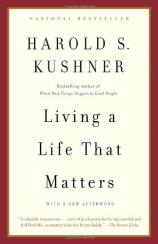Reading Group Guide
Discussion Questions
Living a Life that Matters

CHAPTER 1
Page 5: Kushner quotes one of his teachers as saying, "When I was young, I admired clever people. As I grew old, I came to admire kind people." How does that statement relate to the "two styles of morality" discussed on pages 20-21? Do you think most people go through a similar development? What does that say about what we would like to be admired for?
Page 9: "Mother love says: Nothing you ever do or fail to do will make me stop loving you. Father love says: I will love you if you earn my love and respect, if you get good grades, if you make the team. [The psychoanalyst and author Erich] Fromm insists that every one of us needs to experience both kinds of loving." Do you agree with Fromm and Kushner that "father love" is good and necessary, or do you find it harsh and conditional? Do we need to experience both kinds of love to feel complete?
CHAPTER 2
Pages 28-29: "At the end of the struggle, Jacob is injured and limping, but the Bible nonetheless describes him as shalem, a Hebrew word with connotations of wholeness, integrity, being at peace with oneself. . . . In a sense, Jacob has won by losing." Can you think of other circumstances in which a person can win by losing? A conflict between husband and wife? Between parent and adolescent? Between neighbors? Between nations?
CHAPTER 3
Pages 51-55: Do you agree with Kushner's assertion that we cannot be complete people and do good things without a strong streak of selfishness? Does that make you feel differently about selfish things you might have done?
Pages 56-57: How would you answer the questions Kushner put to his teenage students about stealing from a vending machine?
CHAPTER 4
Page 62: "I define revenge as punishment in the name of justice, tarnished by taking pleasure in hurting the person being punished." In a subsequent interview, Kushner has refined the definition further: Justice is hurting someone who deserves to be hurt; revenge is hurting someone because it makes us feel better to hurt him. Do you agree with that definition, and if so, is revenge ever morally justifiable? What other ways of "making you feel better" might be alternatives to vengeance?
CHAPTER 5
Page 93: "How can you be sure that it is God's voice and not your own wishful thinking? Of the many voices that echo in our minds, how do we recognize the authentic voice of God?" Over the course of centuries and in recent history, we have seen people do terrible things in the belief that they were carrying out the will of God. On what basis do we declare them tragically misguided while insisting that the voice we follow is God's true message?
Pages 101-5: Is Isaac Bashevis Singer's character Gimpel the Fool to be envied or pitied?
CHAPTER 6
Page 116: What do you get out of friendship that you don't find in family or work?
CHAPTER 7
Pages 139-40: "Communal standards and communal pressure, the combined force of good people banding together, will do more to curb wrong behavior than either sermons or threats of jail." Do you agree? What are some of the ways in which a person's character and values might be shaped by his or her living in one community rather than another? How does this apply to young people leaving for college?
CHAPTER 8
• Has Living a Life That Matters affected your perspective on life? How has this book encouraged you to see things differently? In one sentence, what would you like to be your personal legacy?
Living a Life that Matters
- Publication Date: August 20, 2002
- Paperback: 176 pages
- Publisher: Anchor
- ISBN-10: 0385720947
- ISBN-13: 9780385720946







